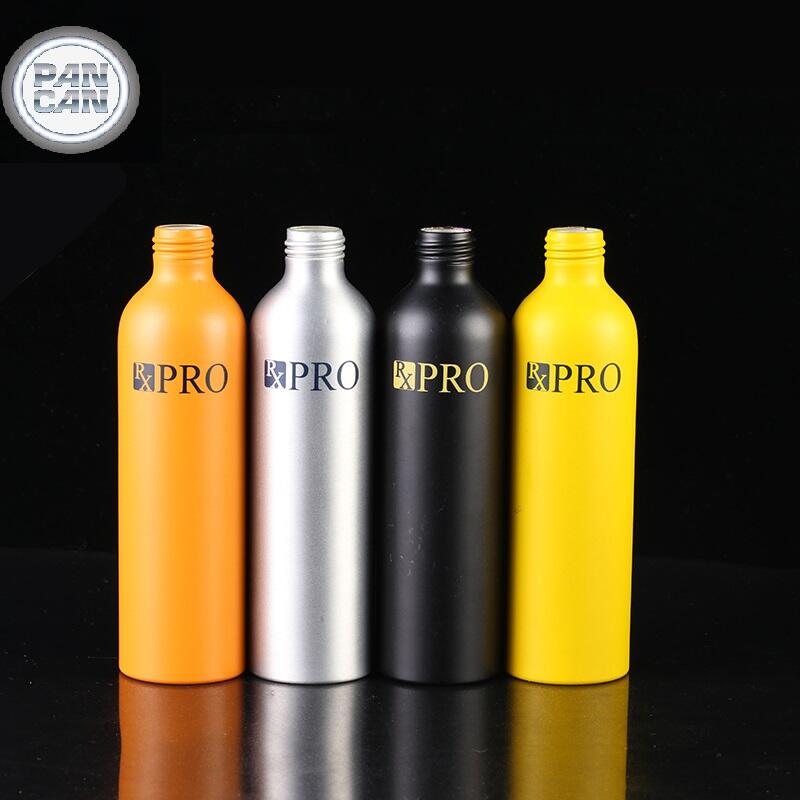การเพิ่มขึ้นของโซลูชันบรรจุภัณฑ์เครื่องดื่มที่ยั่งยืน
อุตสาหกรรมบรรจุภัณฑ์เครื่องดื่มกำลังประสบกับการเปลี่ยนแปลงครั้งสำคัญ เนื่องจากผู้บริโภคให้ความสำคัญกับทางเลือกที่ยั่งยืนมากขึ้นแทนภาชนะพลาสติกแบบดั้งเดิม ขวดอลูมิเนียมได้กลายเป็นหนึ่งในตัวเลือกชั้นนำในการปฏิวัติเพื่อสิ่งแวดล้อมนี้ โดยนำเสนอความทนทาน การรีไซเคิลได้ และประโยชน์ต่อสิ่งแวดล้อมที่เหนือกว่าพลาสติกทั่วไป เมื่อทั้งแบรนด์และผู้บริโภคต่างมองหาวิธีลดผลกระทบต่อสิ่งแวดล้อม การเข้าใจถึงข้อได้เปรียบของการใช้ขวดอลูมิเนียมเมื่อเทียบกับทางเลือกอื่นจึงมีความสำคัญอย่างยิ่งต่อการตัดสินใจเลือกบรรจุภัณฑ์เครื่องดื่มอย่างมีข้อมูล
กระแสโลกที่เคลื่อนไหวสู่บรรจุภัณฑ์ที่ยั่งยืนได้ผลักดันให้ขวดอลูมิเนียมก้าวขึ้นมาอยู่แนวหน้าของนวัตกรรม ภาชนะอเนกประสงค์เหล่านี้ไม่เพียงแต่ช่วยคงคุณภาพของเครื่องดื่มไว้ แต่ยังแก้ไขปัญหาด้านสิ่งแวดล้อมหลายประการที่เกิดจากระบบการบรรจุภัณฑ์พลาสติก ตั้งแต่การยืดอายุการเก็บรักษาไปจนถึงความสามารถในการรีไซเคิลที่ยอดเยี่ยม ขวดอลูมิเนียมกำลังเปลี่ยนแปลงวิธีคิดของเราเกี่ยวกับการจัดเก็บและการบริโภคเครื่องดื่ม
ผลกระทบต่อสิ่งแวดล้อมและคุณสมบัติของวัสดุ
การรีไซเคิลและการอนุรักษ์ทรัพยากร
หนึ่งในข้อได้เปรียบที่น่าสนใจที่สุดของขวดอลูมิเนียมคือสามารถรีไซเคิลได้ไม่จำกัดจำนวนครั้งโดยไม่เสื่อคุณภาพ ซึ่งแตกต่างจากขวดพลาสติกที่มักเสื่อมคุณภาพลงระหว่างการรีไซเคิล ขวดอลูมิเนียมสามารถรีไซเคิลซ้ำได้หลายครั้งโดยยังคงรักษารูปทรงและความแข็งแรงไว้ได้ คุณลักษณะนี้ช่วยลดความต้องการวัตถุดิบใหม่ และลดผลกระทบต่อสิ่งแวดล้อมอย่างมาก การรีไซเคิลขวดอลูมิเนียมเพียงหนึ่งขวด ช่วยประหยัดพลังงานได้มากพอที่จะใช้เปิดโทรทัศน์ได้นานประมาณสามชั่วโมง แสดงให้เห็นถึงศักยภาพในการประหยัดพลังงานที่สำคัญของบรรจุภัณฑ์ชนิดนี้
กระบวนการรีไซเคิลขวดอลูมิเนียมยังมีประสิทธิภาพด้านพลังงานมากกว่าพลาสติก โดยใช้พลังงานเพียง 5% ของพลังงานที่ใช้ในการผลิตอลูมิเนียมใหม่ ประสิทธิภาพนี้ทำให้เกิดคาร์บอนฟุตพรินต์ที่ต่ำกว่าตลอดวงจรชีวิตของผลิตภัณฑ์ ทำให้ขวดอลูมิเนียมเป็นทางเลือกที่รับผิดชอบต่อสิ่งแวดล้อมสำหรับบรรจุภัณฑ์เครื่องดื่ม
การเปรียบเทียบรอยเท้าคาร์บอน
เมื่อพิจารณาตลอดวงจรชีวิตของบรรจุภัณฑ์เครื่องดื่ม ขวดอลูมิเนียมแสดงถึงประสิทธิภาพที่ดีกว่าในด้านสิ่งแวดล้อม แม้การผลิตอลูมิเนียมในช่วงแรกอาจใช้พลังงานมากกว่าการผลิตพลาสติก แต่ประโยชน์ในระยะยาวนั้นคุ้มค่ากับการลงทุนครั้งแรกนี้ น้ำหนักเบาของขวดอลูมิเนียมช่วยลดต้นทุนการขนส่งและปริมาณการปล่อยก๊าซเรือนกระจกที่เกี่ยวข้อง ในขณะที่อัตราการรีไซเคิลที่สูงกว่าทำให้มีผลกระทบต่อคาร์บอนฟุตพรินต์โดยรวมที่ต่ำกว่า
งานวิจัยหลายชิ้นแสดงให้เห็นว่า ขวดอลูมิเนียมเมื่อรีไซเคิลอย่างเหมาะสม สามารถกลับมาวางจำหน่ายบนชั้นวางร้านค้าได้ภายในเวลาเพียง 60 วัน กระบวนการรีไซเคิลที่รวดเร็วนี้ช่วยลดผลกระทบต่อสิ่งแวดล้อมอย่างมีนัยสำคัญ เมื่อเทียบกับขวดพลาสติก ซึ่งอาจใช้เวลานับร้อยปีกว่าจะย่อยสลายในหลุมฝังกลบ
คุณสมบัติการออกแบบและความสะดวกในการใช้งาน
การควบคุมอุณหภูมิและคุณภาพของเครื่องดื่ม
ขวดอลูมิเนียมมีความสามารถโดดเด่นในการรักษาระดับอุณหภูมิของเครื่องดื่ม ไม่ว่าจะเป็นเครื่องดื่มร้อนหรือเย็น วัสดุที่มีการนำความร้อนได้ดีทำให้เครื่องดื่มเย็นเร็วขึ้นและคงความเย็นได้นานกว่าขวดพลาสติก คุณสมบัตินี้ไม่เพียงแต่ยกระดับประสบการณ์ของผู้บริโภค แต่ยังช่วยลดพลังงานที่ใช้ในการทำความเย็น ส่งผลให้บรรลุเป้าหมายด้านความยั่งยืนโดยรวม
คุณสมบัติการกันสิ่งแปลกปลอมของอลูมิเนียมยังช่วยป้องกันแสงและออกซิเจนได้ดีกว่า ทำให้รักษาคุณภาพของเครื่องดื่มและยืดอายุการเก็บรักษาได้ตามธรรมชาติ ความสามารถในการรักษานี้ช่วยลดของเสียจากอาหารและลดความจำเป็นในการใช้สารกันเสียเพิ่มเติม ทำให้ขวดอลูมิเนียมเหมาะอย่างยิ่งสำหรับเครื่องดื่มระดับพรีเมียมและผู้บริโภคที่ใส่ใจสุขภาพ
ความทนทานและความปลอดภัยของผู้บริโภค
การสร้างขวดอลูมิเนียมที่มีความแข็งแรงทนทานให้ความคงทนถาวรเป็นพิเศษ ช่วยลดความเสี่ยงในการรั่วหรือแตกหักระหว่างการขนส่งและการใช้งาน ความทนทานนี้ทำให้ผลิตภัณฑ์มีอายุการใช้งานยาวนานขึ้น และลดความจำเป็นในการเปลี่ยนใหม่ ซึ่งสนับสนุนเป้าหมายด้านความยั่งยืนเพิ่มเติม อีกทั้งขวดอลูมิเนียมยังปราศจากสาร BPA และสารเคมีอันตรายอื่นๆ ที่มักพบในบรรจุภัณฑ์พลาสติก ทำให้มั่นใจได้ถึงความปลอดภัยในการบริโภคเครื่องดื่ม
การออกแบบขวดอลูมิเนียมสมัยใหม่ใช้เทคโนโลยีการปิดผนึกขั้นสูงและคุณสมบัติป้องกันการแก้ไข ทำให้ผู้บริโภคมีความมั่นใจและความปลอดภัยเพิ่มมากขึ้น คุณลักษณะด้านความปลอดภัยเหล่านี้ เมื่อรวมกับคุณสมบัติการเป็นเกราะป้องกันตามธรรมชาติของวัสดุ ทำให้ขวดอลูมิเนียมเป็นทางเลือกที่เหมาะสมอย่างยิ่งสำหรับทั้งเครื่องดื่มไม่มีฟองและเครื่องดื่มที่มีฟอง
ผลกระทบทางเศรษฐกิจและตลาด
การวิเคราะห์ต้นทุนและประสิทธิภาพการผลิต
แม้ต้นทุนการผลิตขั้นต้นของขวดอลูมิเนียมอาจสูงกว่าทางเลือกจากพลาสติก แต่ประโยชน์ทางเศรษฐกิจในระยะยาวมีอยู่มาก ค่าการรีไซเคิลที่สูงของอลูมิเนียมช่วยสร้างระบบวงจรปิด ซึ่งช่วยลดต้นทุนวัตถุดิบลงในระยะยาว นอกจากนี้ ความทนทานของขวดอลูมิเนียมยังทำให้มีความจำเป็นในการเปลี่ยนน้อยลง และลดจำนวนการเรียกร้องตามประกัน ซึ่งส่งผลให้เกิดการประหยัดต้นทุนตลอดห่วงโซ่อุปทาน
กระบวนการผลิตขวดอลูมิเนียมมีความมีประสิทธิภาพเพิ่มขึ้นอย่างต่อเนื่องด้วยความก้าวหน้าทางเทคโนโลยี ส่งผลให้ต้นทุนการผลิตลดลงและขยายขนาดการผลิตได้ดีขึ้น ความก้าวหน้าเหล่านี้ทำให้ขวดอลูมิเนียมสามารถแข่งขันได้ดียิ่งขึ้นในตลาดบรรจุภัณฑ์เครื่องดื่ม โดยยังคงรักษามาตรฐานด้านสิ่งแวดล้อมที่เหนือกว่าไว้ได้
มูลค่าแบรนด์และการรับรู้ของผู้บริโภค
บริษัทที่นำขวดอลูมิเนียมมาใช้มักได้รับการรับรู้จากแบรนด์ในเชิงบวกจากผู้บริโภคที่ใส่ใจสิ่งแวดล้อม การออกแบบและสัมผัสระดับพรีเมียมของบรรจุภัณฑ์อลูมิเนียมสื่อถึงคุณภาพและความรับผิดชอบต่อสิ่งแวดล้อม ซึ่งอาจทำให้สามารถตั้งราคาได้สูงขึ้นและเพิ่มส่วนแบ่งตลาด การเชื่อมโยงในเชิงบวกนี้ช่วยให้แบรนด์สามารถแยกตัวเองออกจากคู่แข่งในตลาดที่มีการแข่งขันสูง ในขณะเดียวกันก็สนับสนุนเป้าหมายด้านความยั่งยืน
ผลการวิจัยตลาดแสดงให้เห็นว่าผู้บริโภคมีแนวโน้มเต็มใจที่จะจ่ายเงินมากขึ้นสำหรับทางเลือกบรรจุภัณฑ์ที่ยั่งยืน โดยเฉพาะขวดอลูมิเนียมที่ได้รับความนิยมจากกลุ่มมิลเลนเนียลและเจเนอเรชันแซด ความต้องการนี้บ่งชี้ถึงโอกาสทางการตลาดที่กำลังเติบโตสำหรับแบรนด์ต่างๆ ที่ลงทุนในโซลูชันบรรจุภัณฑ์ขวดอลูมิเนียม
แนวโน้มและนวัตกรรมในอนาคต
การ พัฒนา ทาง เทคโนโลยี
อุตสาหกรรมขวดอลูมิเนียมยังคงพัฒนานวัตกรรมอย่างต่อเนื่อง โดยมีการพัฒนาใหม่ๆ ด้านการออกแบบที่เบากว่าเดิม และกระบวนการรีไซเคิลที่ได้รับการปรับปรุง เทคโนโลยีบรรจุภัณฑ์อัจฉริยะ เช่น หมึกที่ไวต่ออุณหภูมิและรหัส QR กำลังถูกนำมาใช้ร่วมกับขวดอลูมิเนียม เพื่อเพิ่มมูลค่าและความสามารถในการใช้งานให้กับทั้งแบรนด์และผู้บริโภค นวัตกรรมเหล่านี้คาดว่าจะช่วยสร้างความแตกต่างให้กับขวดอลูมิเนียมจากทางเลือกที่ทำจากพลาสติกในอีกไม่กี่ปีข้างหน้า
งานวิจัยเกี่ยวกับเทคโนโลยีการเคลือบขั้นสูงและการบำบัดพื้นผิวมีแนวโน้มที่จะขยายขอบเขตการใช้งานของขวดอลูมิเนียม พร้อมทั้งรักษานวัตกรรมด้านการรีไซเคิลไว้ การพัฒนาเหล่านี้อาจเปิดตลาดใหม่และสถานการณ์การใช้งานใหม่ โดยเฉพาะในอุตสาหกรรมอาหารและเครื่องดื่ม
การเติบโตของตลาดและการนำไปใช้
ตลาดโลกสำหรับขวดอลูมิเนียมมีแนวโน้มเติบโตอย่างมาก เนื่องจากแบรนด์ต่างๆ เพิ่มความมุ่งมั่นในการใช้บรรจุภัณฑ์ที่ยั่งยืน การเติบโตนี้ขับเคลื่อนโดยกฎระเบียบด้านสิ่งแวดล้อมที่เข้มงวดขึ้น ความต้องการของผู้บริโภคที่ต้องการทางเลือกที่เป็นมิตรต่อสิ่งแวดล้อม และความพยายามด้านความยั่งยืนขององค์กร ความหลากหลายและสามารถรีไซเคิลได้ของขวดอลูมิเนียมทำให้ขวดประเภทนี้กลายเป็นหนึ่งในทางออกสำคัญเพื่อตอบสนองความต้องการของตลาดที่เปลี่ยนแปลงไป
นักวิเคราะห์อุตสาหกรรมคาดการณ์ว่าส่วนแบ่งตลาดขวดอลูมิเนียมจะยังคงขยายตัวต่อไป โดยเฉพาะในกลุ่มเครื่องดื่มพรีเมียมและตลาดที่มีจิตสำนึกด้านสิ่งแวดล้อมสูง แนวโน้มการเติบโตนี้ชี้ให้เห็นถึงอนาคตที่สดใสของบรรจุภัณฑ์อลูมิเนียมในอุตสาหกรรมเครื่องดื่ม
คำถามที่พบบ่อย
ขวดอลูมิเนียมแพงกว่าขวดพลาสติกหรือไม่?
แม้ขวดอลูมิเนียมอาจมีต้นทุนเริ่มต้นสูงกว่าขวดพลาสติก แต่คุณค่าในระยะยาวมักทำให้ขวดอลูมิเนียมคุ้มค่ามากกว่า ปัจจัยต่างๆ เช่น ความทนทาน การนำกลับมาใช้ใหม่ได้ และมูลค่าการรีไซเคิลที่สูง ส่งผลให้ต้นทุนรวมตลอดอายุการใช้งานต่ำกว่า นอกจากนี้ ลักษณะของบรรจุภัณฑ์อลูมิเนียมที่ดูพรีเมียมสามารถกำหนดราคาขายปลีกที่สูงขึ้น ซึ่งช่วยชดเชยการลงทุนครั้งแรกได้
ขวดอลูมิเนียมสามารถรีไซเคิลได้กี่ครั้ง?
ขวดอลูมิเนียมสามารถรีไซเคิลได้ไม่จำกัดจำนวนครั้งโดยไม่สูญเสียคุณภาพหรือความแข็งแรงของโครงสร้าง ความสามารถในการรีไซเคิลซ้ำได้ไม่สิ้นสุดนี้ถือเป็นข้อได้เปรียบอย่างมากเมื่อเทียบกับขวดพลาสติก ซึ่งโดยทั่วไปจะเสื่อมคุณภาพระหว่างกระบวนการรีไซเคิล และสามารถรีไซเคิลได้เพียงจำนวนจำกัดก่อนจะใช้งานไม่ได้อีก
ขวดอลูมิเนียมมีผลต่อรสชาติของเครื่องดื่มหรือไม่?
ขวดอลูมิเนียมสมัยใหม่มีการเคลือบผิวด้านในพิเศษที่ช่วยป้องกันไม่ให้เกิดการปฏิกิริยาระหว่างอลูมิเนียมกับเครื่องดื่มภายใน ชั้นเคลือบนี้ทำให้ไม่มีรสชาติหรือกลิ่นของโลหะปนเปื้อน รักษาคุณภาพรสชาติเดิมของเครื่องดื่มไว้ได้อย่างครบถ้วน ในขณะเดียวกันยังให้การป้องกันที่เหนือกว่าจากปัจจัยภายนอก เช่น แสงและออกซิเจน






